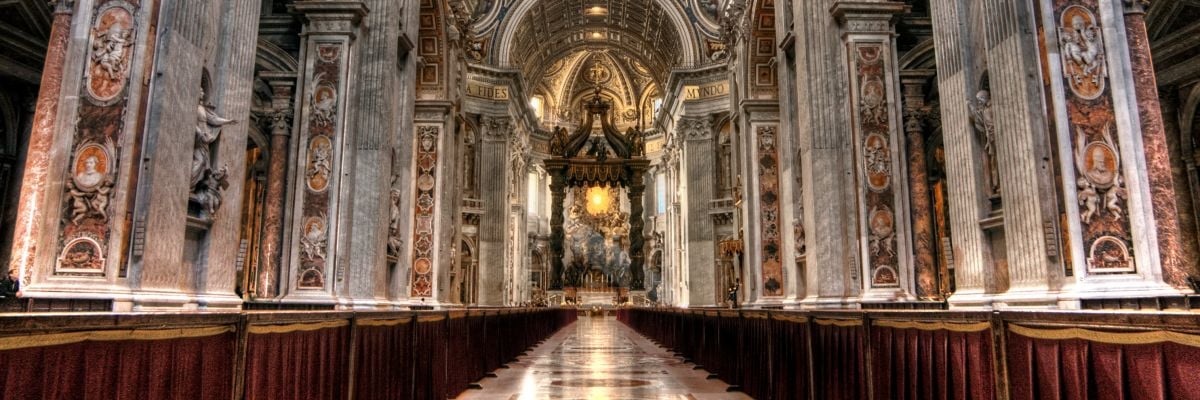
On a warm afternoon, Marcus Grodi and I sat on the back porch of his Steubenville, Ohio, home. His wife, Marilyn, kept their young sons, Jon-Marc, Peter, and Richard, occupied and out of our way. As I looked at the lush yard and marveled at a color rarely seen in Southern California (green), the one-time Protestant minister recounted travails undergone by ministers who convert.
On joining the Church, many find themselves unemployable because they are untrained for work other than in ministry. Worse, they anticipate a warm reception by Church leaders but as often as not feel ignored, having no one take advantage of their pastoral skills. Aware of such frustrations and wanting to help others who were experiencing what he experienced, Grodi founded the Coming Home Network International, an apostolate that helps converting ministers and their families answer not just the question “How then shall we serve?” but also “How then shall we eat?” I asked Grodi about the steps taken by a typical convert.
GRODI: Those who have taken the first step we call inquirers. Sometimes inexplicably, there suddenly is an openness to the Catholic faith.
KEATING: For you, was it out-of-the-blue openness, or was it something you consciously worked toward?
GRODI: It was the unexpected answer to struggles I has having in the pastorate. I happened to tune into EWTN and saw Fr. Benedict Groeschel. I thought he was the weirdest looking guy I ever saw—the typical, goofy-looking monk: long beard, dark habit, studious looking. But I listened to him, and what he said was good. I never expected that a Catholic monk would preach the gospel. But he did. Then it was hearing Scott Hahn, whom I had known some years before. I knew of Scott’s integrity.
KEATING: So you gave weight to what he was saying.
GRODI: I knew him, and I knew that his arguments were biblical. I read your book within a week of becoming reacquainted with Scott. These testimonies were convincing. So the first stage, there is the inquirer: We receive a letter or a call from someone interested in the Catholic faith, but not serious about it.
KEATING: I’m trying to imagine a minister at an Anglican or Methodist or Presbyterian church sitting down and writing a letter to the Coming Home Network. Does he have a sense of disloyalty just in writing the letter? I mean the sense of being disloyal to his people, even if he is only considering the Catholic faith in the abstract: “Not that I’d ever seriously think of becoming a Catholic, of course, but . . .” Is there hesitation in writing that first letter or placing that first call?
GRODI: Yes, and when an inquirer begins thinking about the bigger implications, he’s already in the transition to the next phase, which we call the journey, when he starts looking seriously at the issues. In the inquiry stage he can turn around and never consider the Catholic Church again and never think twice about it. But in the journey stage, he will never think the same about the Catholic Church or about his own Protestant past, because he is dealing with new and convincing information.
KEATING: Does he find himself, in a way, unable not to think about the Church? Is there an obsessiveness in trying to resolve matters?
GRODI: That’s a good way of saying what’s happened here. He can’t just set it aside and never think about it again. In the inquiry stage he can, but not in the journey. For me the transition happened quickly. I recognized there were flaws in sola scriptura, and in no time I knew I could never again hold the old view in quite the same way. I had to struggle to accommodate it. Yet I couldn’t move out of my ministry until I dealt with the issue. For me, the “aha” verse was 1 Thessalonians 3:15, the one about “pillar and foundation.” I’d never seen that before, but I had read it a hundred times.
KEATING: At that point was there fear that you were not going to be able to think it through and remain a Protestant?
GRODI: The journey stage is the stage in which a person is different now. You’ll never be the same. It doesn’t mean you’ll end Catholic or anything, but you’re on a journey of faith and are trying to deal with the damage of the changed understanding. How am I going to live it through, how am I going to understand, how am I going to keep up my integrity? You may have been mildly anti-Catholic before, but now you can become very antagonistic. You’re defensive, and you’re really in a debate internally. I placed my first call to Catholic Answers during this stage. I can’t remember who I argued with, but I was trying to salvage my position.
KEATING: Did you come to any realizations?
GRODI: Yes. I realized that I could never go back. I knew I could never be a Protestant again. I knew in my heart that Luther’s answer to renewal was the wrong answer. Then came the third stage.
KEATING: What do you call it?
GRODI: It’s no man’s land. You say to yourself, “I can never be a Protestant, but I can’t be a Catholic.” I was in this stage for a long time. I was there longer than in the journey—neither a Protestant nor a Catholic, just a sincere follower of Jesus Christ. It was John Henry Newman’s Apology Pro Vita Sua that got me into no man’s land.
KEATING: What brought you out of it?
GRODI: His Essay on the Development of Christian Doctrine got me to the next stage, especially twelve pages right in the middle where he details the development of the papacy. Those twelve pages cooked my goose.
KEATING: Convinced you on the authority question?
GRODI: Right. I had read thick books on the papacy, but it was those twelve pages that did it. The next stage is when a person decides, “I’m going to be Catholic.” He knows that is the direction he has to go. It was at this stage that I knew that one day I would be Catholic. I just didn’t know when. Between the time a person decides to become a Catholic and the time he actually becomes Catholic, it could be years.
KEATING: Is coming into the Church a shock for the former minister?
GRODI: It can be. The monolithic Church he thought he’d find turns out to be more diverse than anything in the Protestant realm. The diversity is especially confusing in the area of spirituality. My prayer life had been very simple before—just me alone in the closet with Jesus. Well, now there are Mary and the saints and the guardian angels . . .
KEATING: . . . and all the different brands of mysticism and prayer life and devotion.
GRODI: It can be overwhelming. When people come into the Church, they also come into a hierarchical system that is different and intimidating.
KEATING: Apart from the strangeness, is there something that especially vexes minister-converts when they come in?
GRODI: Perhaps the biggest disappointment is finding so many Catholics who don’t know their faith, and so many who aren’t practicing it, and so many priests who don’t seem to care. They aren’t making the effort to do what we used to do as ministers. As a pastor, I spent much of my time teaching Scripture, helping my congregation know and live their faith—that was my goal in life. Minister-converts come in and find so much that is left undone. It’s doubly frustrating to me now that I’ve been in the Church for four years. From a pastoral standpoint, I can do everything the local priest does, other than confect the sacraments, but the only thing I’ve been asked to do is bingo!
KEATING: But are you any good at bingo?
GRODI: I don’t know. I’ve never gone. I can’t quite bring myself to go to bingo because I still can’t accept gambling. That’s shows there are some leftovers of Protestantism still in me; it takes a long time to unload all that old baggage. Becoming a Catholic is a bit like becoming a Frenchman. You can learn the language and live in the country, but it will be a long time before another Frenchman mistakes you for a Frenchman. I’m still not sure I’m genuflecting and crossing myself at all the right places.
KEATING: Through the Coming Home Network you try not only to resolve theological problems, but financial as well, but you’ve been stymied for lack of funds.
GRODI: True. We need to start growing because we’re getting requests. The assistance fund is a touchy issue because it’s only available to men and their families once they have come into the Church. We refuse requests from people who are, let’s say, in the journey stage or in no man’s land. They may know they are headed for the Catholic Church, but we have to wait. We don’t want to be perceived as buying converts.
KEATING: But once the commitment is firm, once the conversion is made, they are eligible for assistance?
GRODI: Yes, but I wish we had more to offer. We have so little by way of funds, and there is so little we can do. Many of these former ministers are hurting. They need help getting situated within the Church, even if they have a secular occupation. One man who comes to mind, for instance, came into the Catholic Church at Easter. He is 59 years old and had been in the pastorate for thirty years. So far the only job he has been able to find is as a greeter at Wal-Mart. Another convert has been in the Church for a couple of years, and the only job he has been able to find is reading gas meters. He used to be an Anglican pastor. So the financial assistance is important. The assistance fund can give them breathing room as they become acclimated in the Church and discern how they will serve God and support their families.
KEATING: One last question. Is the Coming Home Network only for clergy?
GRODI: No, our membership of nearly 700 consists of Protestant clergy and laity, as well as fallen-away Catholics at all stages on the journey “home.” Our members include many Catholics who support our work with their prayers and donations.
For information on how you can help converting ministers, laity, and fallen-away Catholics, contact the Coming Home Network.



